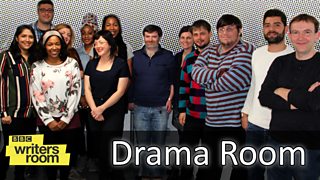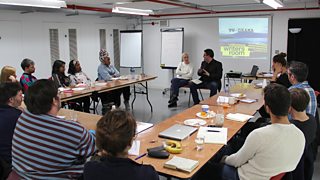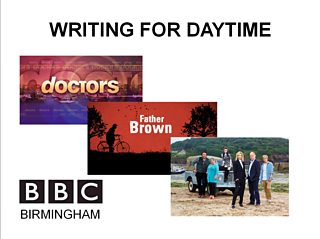Editor's Note: Chandni Lakhani is currently part of ±«Óãtv Writersroom's Drama Room, a development scheme for writers who have submitted successful scripts to our open submission Script Room system, been identified through other writing opportunities or by our talent scouts. The Drama Room runs for six months with sessions including Radio Drama, Children's, Continuing Drama and the most recent, on TV Drama...
Like many households, we were all obsessed with TV when I was growing up. There wasn’t a meal we’d not consider eating in front of it and every day at school I’d look forward to the last hour of the day, spent curled up watching whatever had been taped the previous night. I distinctly remember the evening before one family holiday, we all sat down to watch the pilot of an exciting new show, . Despite it prompting deep anxiety about the flight we were due to take the next day, I was completely in awe of the scale of that first episode, and how quickly I became enthralled by the characters and the mystery of it. I couldn’t believe the freedom shows like this had to tell long-running stories, drawing us in and hurling our investment through twist after twist… so upon discovering that it was someone’s actual job to sit in a room and create polar bears in jungles and a mysterious shadow monster, I knew this was the path for me.
I’ve always had a burning desire to tell stories, when I was really young I had dozens of those little TY beanie babies (which I pretend I’ve kept as a pension fund); each of them had its own backstory and character profile, and I’d spend hours throwing them into various themed scenarios, making up the narrative as I went along. It was a daily miniature soap opera without an audience, which probably sounds a bit deranged now so really I’m very lucky to have found writing as an outlet for all that… But it’s still the child’s-play joy of creating your own world and characters that I cling to every time I sit at my desk.

The Drama Room writers (Chandni is on the left)
For a number of years, I’ve been working on spec' scripts of my own and I’ve found the hardest part is the ability to turn an initial idea into a robust storyline I can stick with, without constantly questioning and reworking it. Despite all the prep work, the first draft often still feels like walking into maze with a blindfold on, but once I’ve figured the thing out and I’m into the drafting process, it’s so rewarding to see your work gradually evolve into something bigger than what you started with.
Over the last few years I’ve been working in TV development, something I pursued so that I could learn more about the industry but also follow the key writing advice I’d been given, which was to read as many scripts as I possibly could. Currently, I’m working on the Netflix series of , which has been a real dream come true and taught me so much about the practicalities of production - as well as of course, being lucky enough to work with showrunners and . It’s amazing to see these different worlds coming to life every episode as part of a truly unique and innovative show - there isn’t another one like it.
All of this has kept me inspired to want to be a writer myself, and so after being longlisted for competition in 2015, which gave me the opportunity to submit a script to ±«Óãtv Writersroom, I was thrilled to receive an email to say they’d enjoyed it and wanted to meet. The whole process of being invited onto the Drama Room scheme was entirely unexpected (I still can’t quite believe it’s happened), but as quite a new writer, it’s been incredible to be part of such a supportive group and given an exclusive taste of all the different writing opportunities within the ±«Óãtv - from Radio to Children’s to TV Drama. The scheme has a real focus on active ways to propel our careers forward, whether that’s by introducing us to development producers and script editors or getting us to come up with our own pitches. It’s so helpful to be shown so many different places to start, and we’ve all been blown away by the number of amazing people who have given up their time to come and share their insight with us.

Hard at work in the Drama Room
In November, we embarked upon the highly anticipated TV Drama day, which began with a session with Head of ±«Óãtv Writersroom followed by . Both were set the difficult task of trying to lay out the practicalities and challenges of having an original drama series commissioned without depressing us from the outset. They did a great job of reminding us to be realistic about the process and how much competition is out there, but ultimately left behind the inspiring message that passion and a great story will always take you far. As quite new writers, many of us were apprehensive about our chances of having an original series reach the development slate, but Johnny assured us that it’s up to us to make sure our scripts stand out from the pile, and that the ±«Óãtv is committed to bringing new and diverse stories to the forefront.
We also got a taste of what it’s really like to have your own show made with writer , who talked us through the development process on her show . Marnie was so down to earth, and reassured us that hard work and persistence really will get your voice heard. There were perhaps some surprising things we learned, like the extent to which the writing process continues throughout production, but it was exciting and inspiring to see someone who was once in our shoes having done so well. Later, we also got a handle on the realities of the writer/script editor relationship from , who demonstrated how important it is to get along with your script editor when they become your key representative on the production. Clare spoke about a particular instance on when research had informed quite a sensitive storyline, which ultimately made it stand out as a brilliant piece of truthful storytelling.

Thirteen, written by Marnie Dickens for ±«Óãtv Three (watch now on ±«Óãtv iPlayer)
The more practical aspect of the day came in the afternoon, when we heard from and who gave us pointers on what they think makes a good pitch. The key questions to focus on were: What’s the world? What makes it interesting? Who’s taking me into it? And is the idea returnable? With Senior Script Executive , we then talked about the process of pitching and what worried us about it. Some of us were more concerned about verbal pitches, and others written ones – but the advice was generally to try and be as clear as possible about what your idea is up front, be passionate about it, and not to worry about staying focussed on one or two pitches in a general meeting, as opposed to a handful. It was great for us to have the chance to air our concerns in such a supportive atmosphere, and it was good to know that many of us were in the same boat for a lot of the worries.
We also got a chance to hear from and who told us about the opportunities on daytime television, something many of us are keen to be involved with. We were all pleasantly surprised with the scope there is to tell original, stand-alone stories on these long-running shows, and also at the fantastic international appeal there is for shows like . All in all, the day was jam-packed with useful advice, inspiration, reassurance and the opportunity to meet people we could be working with in years to come.

Daytime drama produced by ±«Óãtv Birmingham including Doctors, Father Brown and The Coroner
As Drama Room draws to an end, I’m looking forward to continuing all of the relationships I’ve begun over the course of the scheme, both with the other writers and the script editors and producers I’ve been so grateful to meet. I also plan to keep developing some of the ideas that have come to fruition across the Radio, Children’s and TV Drama days, and hope that the new relationships I’ve made will help progress these so that they eventually reach an audience! Most importantly of all, I hope to continue the same proactive approach to my career that the scheme has diligently encouraged, as I embark upon the next stages of finding an agent and getting more of my work out there.
For your chance to be part of the next Drama Room development group submit your script to our next Drama Script Room which will open in December -
